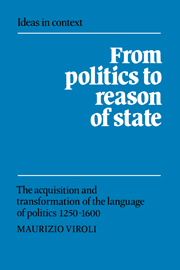 From Politics to Reason of State
From Politics to Reason of State Book contents
- Frontmatter
- Contents
- Acknowledgements
- Dedication
- Introduction
- 1 The acquisition of the language of politics
- 2 The philosophy of the city and the political man
- 3 Machiavelli and the republican concept of politics
- 4 Francesco Guicciardini: between politics and art of the state
- 5 The last glimmerings of civil philosophy
- 6 The triumph of reason of state
- Epilogue. Politics as civil philosophy
- Bibliography
- Index
- IDEAS IN CONTEXT
6 - The triumph of reason of state
Published online by Cambridge University Press: 02 February 2010
- Frontmatter
- Contents
- Acknowledgements
- Dedication
- Introduction
- 1 The acquisition of the language of politics
- 2 The philosophy of the city and the political man
- 3 Machiavelli and the republican concept of politics
- 4 Francesco Guicciardini: between politics and art of the state
- 5 The last glimmerings of civil philosophy
- 6 The triumph of reason of state
- Epilogue. Politics as civil philosophy
- Bibliography
- Index
- IDEAS IN CONTEXT
Summary
As the century came to its end, the language of politics as civil philosophy gave way gradually to the conception of politics as reason of state. The ideological transition manifested itself in various ways: the language of the art of the state penetrated the advice-for-princes books, finding its place close to the conventions of civil philosophy; at the same time learned men gradually regarded the language of politics as practically irrelevant; finally, new concepts and idioms were introduced forming the web of the language of politics as reason of state.
For most of the seventeenth century political writers, reason of state was a new concept to be defined by comparison with the already familiar concept of politics. Some regarded it as the opposite of politics; others as a component of it. As the century went by, the difference between politics and reason of state gradually faded to the point that the two notions became almost synonymous. Once identified with the art of preserving a man or a group's power, politics was no longer regarded as the noblest of all practical sciences. Although the ideological resistance against reason of state never ceased, it was like the resistance of a manifold of generous survivors after a lost battle. Noble as it was, the task of restoring the language of politics as civil philosophy proved to be historically impossible.
A particularly illuminating example of the rise of the language of the art of the state to a public status may be found in the new wave of advice-for-princes books that marked the intellectual scenario of the second half of the century.
- Type
- Chapter
- Information
- From Politics to Reason of StateThe Acquisition and Transformation of the Language of Politics 1250–1600, pp. 238 - 280Publisher: Cambridge University PressPrint publication year: 1992
